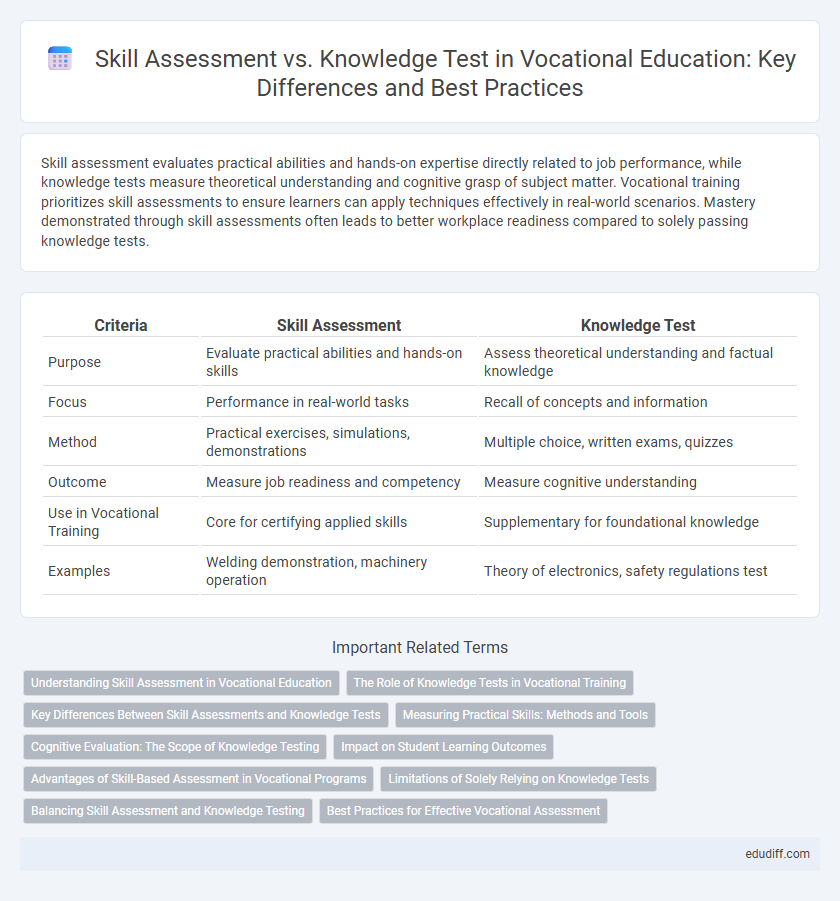Skill assessment evaluates practical abilities and hands-on expertise directly related to job performance, while knowledge tests measure theoretical understanding and cognitive grasp of subject matter. Vocational training prioritizes skill assessments to ensure learners can apply techniques effectively in real-world scenarios. Mastery demonstrated through skill assessments often leads to better workplace readiness compared to solely passing knowledge tests.
Table of Comparison
| Criteria | Skill Assessment | Knowledge Test |
|---|---|---|
| Purpose | Evaluate practical abilities and hands-on skills | Assess theoretical understanding and factual knowledge |
| Focus | Performance in real-world tasks | Recall of concepts and information |
| Method | Practical exercises, simulations, demonstrations | Multiple choice, written exams, quizzes |
| Outcome | Measure job readiness and competency | Measure cognitive understanding |
| Use in Vocational Training | Core for certifying applied skills | Supplementary for foundational knowledge |
| Examples | Welding demonstration, machinery operation | Theory of electronics, safety regulations test |
Understanding Skill Assessment in Vocational Education
Skill assessment in vocational education measures practical abilities and hands-on competencies essential for specific trades, contrasting with knowledge tests that evaluate theoretical understanding. It emphasizes real-world application through tasks, simulations, and performance-based evaluations to ensure learners can effectively perform job-related functions. This approach aligns training outcomes with industry standards, enhancing employability and workforce readiness.
The Role of Knowledge Tests in Vocational Training
Knowledge tests play a critical role in vocational training by evaluating a learner's theoretical understanding of industry-specific concepts, safety protocols, and regulatory standards. These assessments ensure candidates possess essential foundational knowledge before advancing to practical skill application, thereby enhancing overall training effectiveness and job readiness. Accurate knowledge evaluation helps tailor vocational programs to address learning gaps and prepare students for certification or licensing requirements.
Key Differences Between Skill Assessments and Knowledge Tests
Skill assessments evaluate an individual's practical abilities and proficiency in performing specific tasks, emphasizing hands-on experience and real-world application. Knowledge tests focus on measuring theoretical understanding and retention of information through written or verbal questioning. The key difference lies in skill assessments prioritizing demonstration of competency, while knowledge tests emphasize cognitive recall and conceptual comprehension.
Measuring Practical Skills: Methods and Tools
Skill assessments evaluate hands-on abilities through simulations, performance tasks, and real-world scenarios, providing a practical gauge of competency. Knowledge tests primarily measure theoretical understanding using multiple-choice, true/false, or short-answer questions, which may not accurately reflect the application of skills. Tools like virtual reality simulations, standardized skill checklists, and competency-based evaluations enhance precision in measuring practical skills in vocational settings.
Cognitive Evaluation: The Scope of Knowledge Testing
Knowledge testing in vocational skill assessment primarily evaluates cognitive abilities by measuring theoretical understanding and information recall relevant to specific trades or professions. Skill assessments focus more on practical application and hands-on proficiency, whereas knowledge tests encompass problem-solving, critical thinking, and comprehension within the vocational domain. This cognitive evaluation ensures candidates possess the essential foundational knowledge critical for effective job performance and further skill development.
Impact on Student Learning Outcomes
Skill assessment directly measures practical competencies, leading to enhanced student learning outcomes by identifying areas for hands-on improvement. Knowledge tests primarily evaluate theoretical understanding, which may not fully reflect a student's ability to apply concepts in real-world vocational tasks. Integrating both assessments provides a comprehensive evaluation, promoting deeper learning and better preparedness for industry demands.
Advantages of Skill-Based Assessment in Vocational Programs
Skill-based assessments in vocational programs provide a practical evaluation of learners' abilities to apply theoretical knowledge, ensuring readiness for real-world tasks and job performance. These assessments enhance learner engagement by offering hands-on experiences that foster deeper understanding and retention of skills. Employers benefit from skill-based evaluations as they offer a reliable measure of a candidate's competence and readiness to meet industry standards.
Limitations of Solely Relying on Knowledge Tests
Solely relying on knowledge tests in vocational skill assessment limits the evaluation to theoretical understanding, neglecting practical competencies essential for job performance. Knowledge tests often fail to measure hands-on skills, problem-solving abilities, and real-world application, which are critical in trades such as welding, carpentry, and healthcare. This gap can result in inaccurate assessments of a candidate's capability to perform effectively in vocational roles, highlighting the need for integrated skill assessments.
Balancing Skill Assessment and Knowledge Testing
Balancing skill assessment and knowledge testing is essential for effective vocational training evaluation, as skill assessments measure practical abilities while knowledge tests evaluate theoretical understanding. Combining both approaches ensures that learners not only grasp key concepts but can also apply them in real-world scenarios, enhancing job readiness and competency. Integrating performance-based assessments with written or oral exams provides a comprehensive view of a learner's capabilities in technical trades and professional occupations.
Best Practices for Effective Vocational Assessment
Effective vocational assessment integrates both skill assessment and knowledge tests to provide a comprehensive evaluation of competency. Skill assessments emphasize practical, hands-on abilities essential for job performance, while knowledge tests measure theoretical understanding critical to foundational expertise. Best practices include aligning assessments with real-world job requirements, using standardized criteria, and incorporating continuous feedback to enhance learning outcomes and workforce readiness.
Skill Assessment vs Knowledge Test Infographic

 edudiff.com
edudiff.com